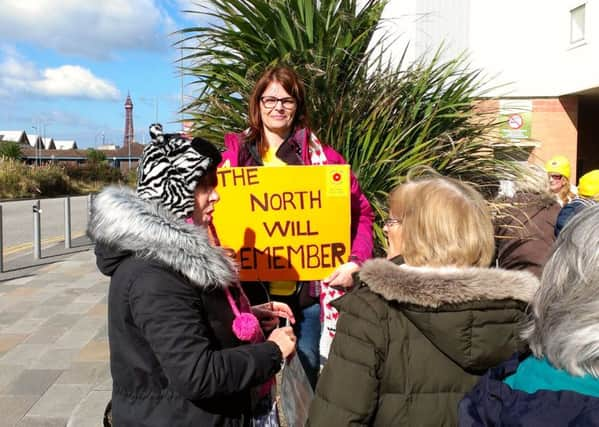Final arguments as Fylde frack appeal ends after 19 days


Mrs Elizabeth Warner gave evidence for the Roseacre Awareness Group in lie of their counsel Robin Green who was unable to attend.
She said much had been made by Cuadrilla about the Ministerial Written Statement from September 16, which it had been implied gave support for fracking.
Advertisement
Hide AdAdvertisement
Hide AdBut she said it only offered support to “safe and sustainable development”.
She said the plans to drill and test frack at Roseacre rejected by Lancashire Country Council in June along with the Preston New Road application were not safe and sustainable.
The roads were too narrow and winding and the noise and visual impact of the site on the area would have adverse effects.
She said: “Trucks would have to negotiate eight kilometres of unclassified and minor roads in places no wider than 4.5m.
Advertisement
Hide AdAdvertisement
Hide AdShe said there was no pavement in many places and the surface was unsuitable for the movement of up to 50 16.5m long 44-tonne trucks.
She was followed by Mr Alan Evans for Lancashire County Council who said the two gas exploration bids and the monitoring array application were contrary to the council’s Development Plan and, as material considerations did not indicate otherwise, should be rejected.
He said that a presumption to allow planning permission due to an absence, silence or outdated policies on shale gas did not apply since previous case studies showed that if a development plan had sufficient general control policies then it could apply despite specifically not mentioning fracking.
He said Cuadrilla’s evidence had sought to downplay the effects of drilling on surrounding areas. And he said forensically dissected landscape reports from Mr Tempany on behalf of Arup and Cuadrilla over a series of photomontages did not show the true height of drill rigs and attacked suggestions that there would be little difference between 33m and 52m high rigs.
Advertisement
Hide AdAdvertisement
Hide AdAttacking Cuadrilla’s assertion that the development would only be temporary he said: “An unacceptable development cannot become acceptable just because its lifetime is limited.”
He said Cuadrilla’s noise limit of 42 decibels was too high and the real limit should have been 35db or lower to avoid adverse health impacts on neighbours.
He too said roads in the area were unsuitable for articulated lorries servicing the Roseacre site and said no mitigation could solve that.
Nathalie Lieven from Cuadrilla was the last to sum up and she began by saying National Planning Policy Framework guidelines say permission should be granted if local policies are absent, silent or out of date on shale gas.
Advertisement
Hide AdAdvertisement
Hide AdShe said there was no local policy which reflected the Government’s support for this kind of minerals development therefore the council’s reliance on “general” polices were wholly inadequate.
She said first PEDL licences were granted in 2008 and so the council had been aware of shale gas for six years but had not adopted any strategic approach to SG applications.
She attacked Friends Of The Earth’s assertion that the Paris Agreement outlawed fossil fuel exploration but she said the Government regarded shale supporting climate change targets as a bridge. And added the Paris agreement was not enforceable in domestic law.
She said there were only 34 properties close to the two sites and that national planning guidance suggested a noise level of 42db was adequate.
Advertisement
Hide AdAdvertisement
Hide AdShe conceded that: “A 36/53m rig which needs to be lit at night is going to look out of character in just about any site in the UK” but it was temporary and everything on site was wholly reversible.
She said Preston New Road was close to the busy A583 and M55 and with other non-rural features clearly visible it is impossible to describe it as deeply rural or tranquil.
She said the traffic management plan would ensure no major issues would occur and said there were no real material reasons to refuse the appeal.